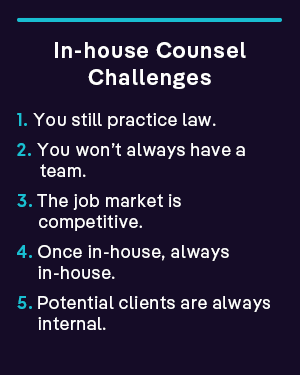The in-house counsel role has evolved from a reactionary legal advisor to a vital strategic consultant, decision-maker, and proactive risk manager. In-house lawyers now work closely with executives across the organization in a variety of capacities. An Association of Corporate Counsel survey found that Chief Legal Officers reported that although they spend, on average, 28% of their time providing legal advice, they also spend a significant amount of time on board matters and governance issues, contributing to strategy developments, and advising other executives on non-legal issues.
What are the primary responsibilities of an in-house legal counsel? A typical job posting will likely contain the following:
- Provide accurate information to executives on a variety of legal topics
- Collaborate with corporate management and internal legal teams to create risk management strategies
- Define internal governance and compliance policies
- Lead litigation cases and dispute resolution processes
- Research legal issues that could impact the company’s reputation and success
- Communicate and negotiate with external parties, such as outside counsel, vendors, partners, and government officials
- Draft various legally-binding documents, including contracts, privacy policies, agreements, and terms and conditions
- Provide guidance to the entire company regarding complex legal language
- Manage complicated matters with key stakeholders
Key Differences Between Private Practice and In-House Lawyers
Lawyers often move from private practice to an in-house counsel position. And while both roles practice law, they have some major differences.
Multiple Clients vs “One Client”
Generally, in private practice, days are spent balancing and prioritizing different clients’ needs, working on time-sensitive cases, and (as you progress in your career) searching for prospective clients. In addition to the legal work, there’s always the requirement to keep and track time. For those who are seeking to “make partner,” there are often more overt requirements to “build a book of business” and focus on developing and maintaining relationships (a good thing, regardless).
In-house attorneys’ schedules can widely vary from day to day. There is more of unpredictability to the role in terms of daily tasks, which can be very attractive to many. Furthermore, working closely with different areas of the business and regular meetings with upper-level executives can also be enticing, as they are able to build strong relationships with co-workers, rather than feeling siloed in an office. Many in-house lawyers also find that while you might have “one client,” in-house counsel gets to experience more areas of practice and a deeper connection and knowledge of the industries in which they work.
Work Experience Diversity
In-house legal team professionals engage in so many different legal and strategic aspects of a business. Combining financial, business, and management skills makes in-house lawyers key contributors in the overall company’s health. Leveraging this experience can easily transition to new positions within their current employer, or the ability to find employment elsewhere.
Legal Expert vs Business Expert
General counsel typically requires a greater breadth of knowledge and has more opportunities to provide meaningful thought leadership than those working in private practice. While private practice lawyers can specialize by practice group within the firm, in-house practitioners have a much broader range of knowledge that can encompass administrative, employment, procurement, property, litigation, and finance law.
In-house lawyers must also have significant, intimate knowledge of their employer as they will be collaborating with the entire organization and working alongside C-level executives.
Defined Career Progression vs unknown path
Law firm candidates typically start as an associate, with the ultimate goal of making partner by securing potential clients and becoming a revenue generator for the firm. In-house attorneys’ career paths, however, can vary substantially between people. Some might opt to change companies, switch to a law firm, become a management advisor versus a legal advisor, explore C-level business opportunities, or rise to that GC or Chief Legal Officer role.
Revenue Generator vs Cost Center
Private practice lawyers typically generate revenue and income for the firm, while in-house attorneys are often seen as a cost center. It is easy for private practice counsel to quantify their value to the firm by billable hours and number of clients. Yet in-house legal team members, without contract lifecycle management software, can struggle with proving their economic value. As a result, in-house lawyers are often tasked with creating efficiencies for the way legal business is produced and managed to ultimately cut costs.
Why In-House Counsel Jobs are Highly Sought After by Lawyers
Zippier estimated demographics and statistics for corporate counsels in the United States and found there are more than 52,442 corporate counsels currently employed in the United States. Why are lawyers attracted to in-house positions and general counsel roles? First and foremost, every position is unique. Depending on the client, or employer, the work and required knowledge will vary and being resourceful is important. Learning new skills, new industry data, internal policies, and guiding the company’s direction is exciting and makes it easy to stay engaged.
Not only do in-house legal counsel gain expertise in law, they also have opportunities to perform more generalist duties. The role isn’t limited to desk work all day. It’s quite the opposite by interacting with all different people and aspects of the business.
Corporate legal counsel are viewed as respected leaders and are leveraged for important advice and intelligence. Being in a position revered by fellow co-workers improves job satisfaction and boosts a confident work environment.
Because in-house lawyers work in a corporate environment, their schedule often follows that of other personnel. This means that a standard 9-5 job is more attainable, including vacation time without feeling guilty. Work/life balance is encouraged more since billable hours are not required and demanded.
In-house Counsel Challenges

While the benefits of being an in-house legal counsel are very attractive, there are also challenges that accompany them. Here are just a few things to consider:
- You still practice law. In-house work isn’t an escape from being a lawyer and it doesn’t get you out of wearing the legal hat. You will still be responsible for the legal functions of the organization. If practicing law isn’t your thing, in-house counsel isn’t either.
- You won’t always have a team. Depending on the size of your company, it is quite possible that you are the only licensed attorney. This can mean a lot of work – all of the time.
- The job market is competitive. Because in-house legal jobs are so valued and desired, it can be difficult to find one at all. And even if you are able to find and get a job offer, it might not be in an industry that you find interesting or appealing.
- There used to be a sense that once a lawyer decides to leave law firm life and go in-house, it is extremely difficult to ever go back to a firm. Nowadays, this isn’t necessarily true, but unfortunately, some hiring managers are still hanging on to this outdated perception.
- Potential clients are always internal. This can be wonderful for many reasons. You can build close relationships with co-workers and help the business in a number of ways. On the flip side, some lawyers enjoy seeking out new clients for a firm and creating those relationships outside of the office.
Whether you are interested in going in-house, are currently employed as an in-house attorney, or work for a law firm, legal work has its benefits and challenges – just like any job. It is important to understand how those benefits and challenges directly impact YOU and your goals.










